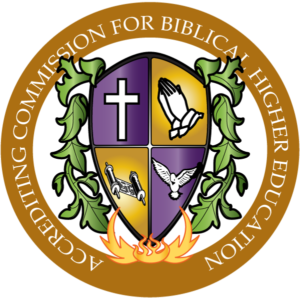ACBHE Standards

Standards for Accreditation
Types of Institutions:
Schools may be either classroom or distance education based (or combination). Schools may be (but are not required to be) corporate structured or state licensed for Theological training. Church based Bible Schools are also accepted. Schools must clearly displays the philosophy and the goals and objectives of the education system.
Organization:
Schools must show a clearly defined and workable organizational structure that facilitates the complete execution and completion of the goals and philosophy proposed by the institute. The structure should define the position and function of the staff and faculty as well as the administrative management of the school. A comprehensive record system must be in place covering all areas.
Curriculum:
A curricular program with written course descriptions and objectives that provides adequate information for the student’s consideration. There shall be adequate instructional resources to implement the curricular program. The curriculum should be of an approved nature consisting of higher education text books and/or time proven established materials or media, suitable and adequate for the completion of the objectives and goals, outlined for the course/s of instruction. Ample materials shall be supplied to insure the completion of training to meet the desired objectives of the course of studies.
Graduate Certification:
Schools shall grant certificates of completion or qualified diploma for the completion of studies. Degree granting Institutions must be qualified to grant degrees either from governmental agencies or through affiliated status with registered Ministries or Denominations. Unauthorized or unlawful granting of Degrees will not be tolerated for accreditation standards.
Instructors:
Instructors shall have education of a higher degree than the courses they instruct. Instructors shall be (in some fashion) certified or otherwise qualified for the instruction of the proposed course curriculum. Unlicensed or uncertified instructors shall be under the direct supervision of a qualified mentor or instructional administrator.
Instruction:
The curriculum shall be structured to provide a gradual and logical progression to reach the desired objectives outlined in the course description. Structured teaching plans will be set to allow continual assessment of the student’s progress through the course of studies.
Student Survey:
Schools shall be able to supply a survey of graduated students that have reached a level of achievement in the field of relative studies completed through the courses of the school. This shall provide final proof of successful completion toward the projected goals and objectives set out by the school.
Physical Facility:
The school shall provide adequate proof of classrooms and/or administrative offices and the physical location of these facilities.
Financial Status:
The school will show proof of financial structure that facilitates the operation of the school. This will include the allowance for instructor and administration wages and overhead institute base expenses. The school will show financial responsibility to any accrued debts and a effectual plan of managing these costs. The long range growth will be accounted for in the budgetary system and thorough records will be kept at all times.
Accreditation:
The school will have been in existence for not less than one year. A school with less than one year of existence will be placed in Candidate Status. This position will be held until it has performed for not less than one full year from application date and may continue for not longer than three years. A school may qualify if it has already achieved accreditation through any recognized accrediting body or if it has been in existence for many years and is generally recognized by its performance and history.
